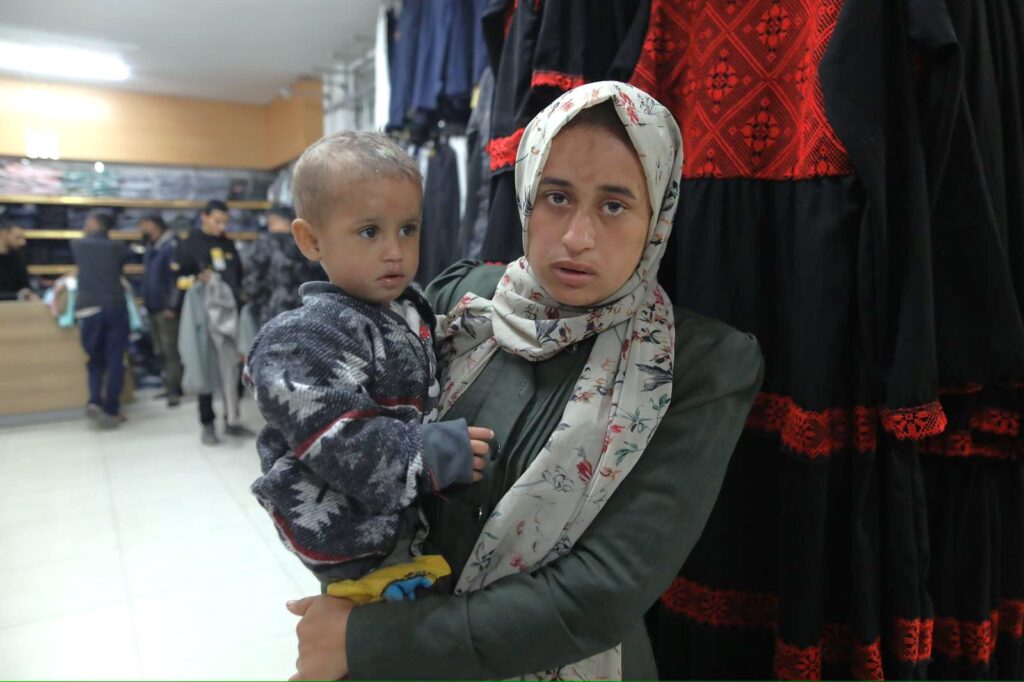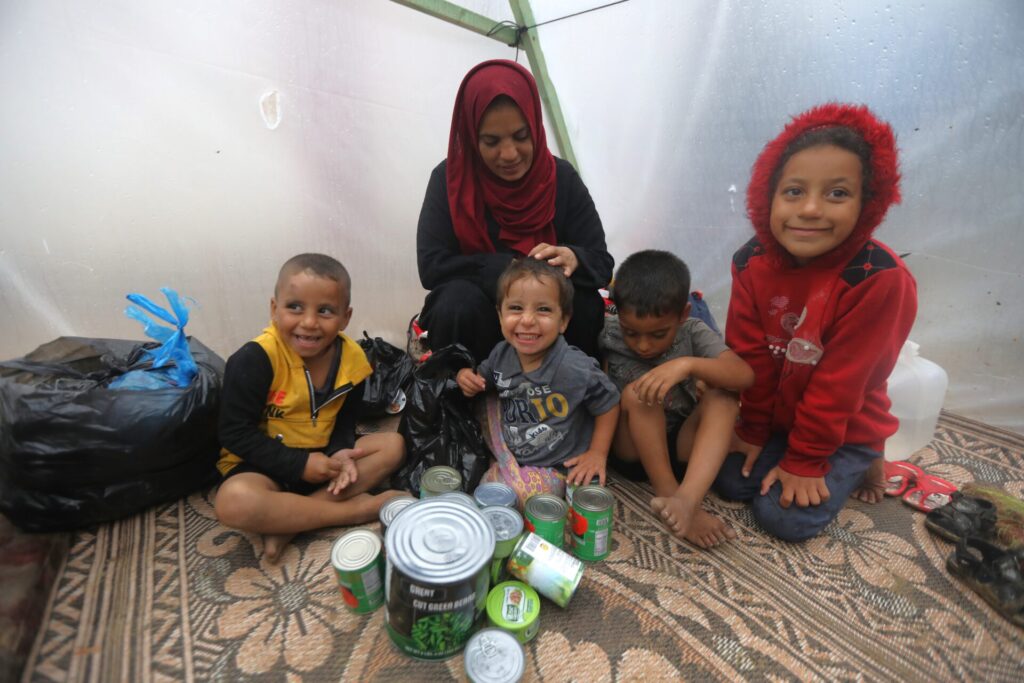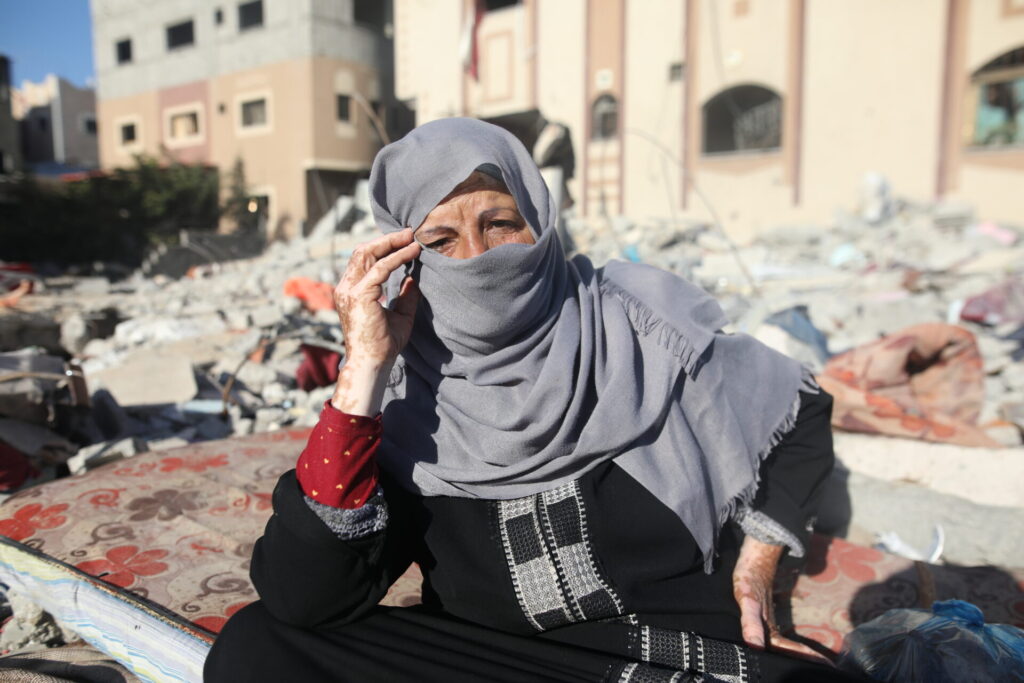Voices From Gaza: A Collective Journal
Posted in: Voices from the field
The world has witnessed, on social media, the power of first-person storytelling from Gaza, an area commonly misunderstood, misidentified, or simply unfamiliar to the world. These stories reveal the humanity of Gaza that is often lost in mainstream media. To keep the narrative alive, we bring to you, here, a series of stories from individuals in Gaza who share their experiences since the war in Gaza began on October 7.
January 29, 2024: I had no choices left.


When the war erupted, Bara’a was displaced along with her husband and small son.
“I had no choices left, so I tried to seek refuge at my aunt’s house. Unfortunately, my aunt, already burdened with financial difficulties and many people living at her home in Rafah, couldn’t accommodate us. The only option I had was to build a makeshift tent to shield my family from the outside conditions.”
Bara’a and her son, Mohammad, faced the chilling winds of winter without a blanket or mattress to comfort them. Determined to provide, she began selling tea where she could so she could supply her family with essential items.
One rainy day, Bara’a’s life took an unexpected turn. She crossed paths with a kind woman named Maysoon. “This woman saw my struggle and reached out to help,” Bara’a said. Masyoon offered Bara’a a chance to sell tea in her supermarket. This not only provided a source of income but also gave Bara’a a sense of community and support.
Additionally, she was able to receive help from Anera. With support from UMCOR, we provided Bara’a and her family with cash vouchers that they could exchange for winter clothes. “I left my house when it was hot two months ago, we left wearing summer clothes. With what I make selling tea, I couldn’t afford to buy any new clothes. We finally were given the chance to buy jackets and winter clothes to stay warm.”
Despite this support, Bara’a continues to grapple with the lack of a proper shelter. Like so many other displaced families in Gaza, her family’s makeshift tent offers little protection from the rain and bitter cold.
January 5, 2024: I dream of living a normal life.


In Gaza, where stories of resilience and struggle intertwine, Islam faces a battle on two fronts. Not only is he fighting cancer, but the ongoing war has added layers of hardship to his already challenging life. Displaced from his home from the start of the war, now reduced to rubble, he found himself taking chemotherapy when it was sporadically available within the confines of a school classroom that became his refuge.
Before Islam was diagnosed with a severe case of cancer, he spent his days as a construction worker. “Three years ago, I had to stop my work as I was getting too weak and focus on receiving treatment for my cancer,” he recounts. During that challenging time, Islam was fortunate to receive a referral for treatment at a hospital in Jerusalem. A surgical procedure followed, during which doctors had to remove some of his organs. Present day, there’s little hope for him to continue his treatment at the Jerusalem hospital. Now, he waits anxiously for the news that would deem him eligible to seek treatment in Turkey. “A few patients with severe cancer have been fortunate enough to leave; I am patiently waiting for my turn.”
In the midst of the conflict, life in the shelters became a daily struggle. Islam, like many others, grappled with the scarcity of food and the absence of basic necessities. He shared,
“There is no clean water to drink from, so we have to resort to polluted water. The lack of food has left me suffering from severe stomach issues.”
The challenges extend beyond the immediate effects of war. The hospital where Islam received his chemotherapy is inaccessible at this time, leaving him with limited access to crucial medical treatments. Islam’s story extends beyond his personal experience, Islam’s wife is also battling kidney failure and is not getting her treatment, and both are face deteriorating health conditions making it almost impossible for them to care for their children.
Expressing his heartfelt plea, Islam said, “I really hope that every organization and everyone with a heart will take care of us. I wish for the war to end swiftly, for life to return to its normal rhythm, and to find another home. I dream of living a normal life and having the opportunity to travel for my cancer treatments.”
In the midst of hardship, Islam’s story echoes the struggles and challenges of countless voices in Gaza, each a testament to the human spirit enduring in the face of the war.
Every year in Gaza, over 2,000 people are diagnosed with cancer, and over 1,000 individuals depend on kidney dialysis for their survival. Prior to the onset of the war, there were 36 hospitals in Gaza. However, as of now, 23 are completely non-functional, 9 operate at a partial capacity, and 4 are functioning at a minimum level. In the northern part of the strip, there are no operational hospitals.
December 12, 2023: I wasn’t sure if we were going to make it.


Saida, a 36-year-old mother from Gaza, faces immense challenges in the wake of the war. After her displacement just a few weeks ago from her home in Moaskar Refugee Camp in Gaza City, Saida endured a grueling journey of approximately 28 kilometers (about 17 miles), covering it half by foot and half by car with her children. The mother of 11 children now resides in a cramped makeshift tent near Naser Hospital in Khan Younis that provides little shelter for her large family.
As winter intensifies, the dropping temperatures worsen their already dire situation. Reflecting on her trek, Saida says, “Getting to where I am at now was one of the most terrifying times in my life; I wasn’t sure if we were going to make it.”
With the many struggles of being displaced and leaving her home with nothing, Saida also grapples with the harsh reality that her children lack warm clothing, resulting in declining health for her family. “The inability to get medicine for my children just makes their health conditions worse, making each passing day even more challenging than the last,” she says.
Looking ahead, Saida is burdened with concerns about the post-war period. Questions loom about if she can go back to her home, if her home is still in a livable condition, the well-being of her children, their health prospects, and the daunting task of providing them with necessary treatment and basic necessities. “The uncertainty of the future weighs heavily on me,” highlighting the profound impact of the war on the lives of innocent civilians like Saida and her family.
Despite the hardship, Saida clings to the hope of returning to her home one day, with the hope that “there will be a forever truce.” As her aspirations hinge on the possibility of an official truce that would allow a safe return and a return to normalcy for her family. She expresses,
“I just want to go home. I want my children to go back to school. I want them to have dreams for their future, but at this moment in my life, that all seems to be so far away.”
December 4, 2023: I will not leave.


This is Fawziya. With 18 family members in tow, and like countless others in Gaza, Fawziya faced the harsh realities of the war.
With being displaced and traveling by foot to seek refuge at a UN shelter she said, “The situation at UN school shelters is so terrible. We couldn’t even use the bathroom; we had to walk to another school for such basic needs.”
Life in the shelters was a daily struggle. With a lack of food and basic necessities, she explained,
“The school where we were seeking refuge in didn’t have water. Life at the schools is extremely difficult. Sitting in a tent outside is way better than sitting at a school for shelter. It’s full of people and diseases; my grandson got sick. We had a horrible time at the shelter.”
Amidst the turmoil, Fawziya seized an opportunity during the war truce. “I came back to my home walking,” she said. Despite her home being reduced to rubble, returning held a profound significance. “Now with the truce, we came back to our home, even though it’s all rubble. But it’s still so much better. This is my home, my land, my life, and I will not leave.“
More entries to come.
OUR BLOG
Related
Part of a series on the impact of the war on all sectors of economic life within Gaza, Anera’s immediate response and plans for the future. Other posts cover housing, education, WASH, health and food production systems. Livelihood Recovery In Gaza, 57 years of occupation and…
InterAction and 50 Member CEOs, some of whom have organizations that work in Gaza, urge President Biden to take decisive and actionable steps to alleviate the humanitarian crisis in Gaza. Detailed within this letter are specific steps and commitments that…
